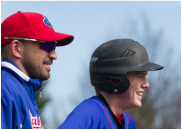In a situation like this, I think it is very important to first understand whether the player is truly unwilling to make adjustments or if it is a situation where they are unable (either physically or mentally). If they have a physical or mental impediment that is reducing their ability to change and adapt to the requests of a coach, this needs to be removed before the player will begin to utilize feedback. I often see players who are benched and labelled as uncoachable for not making adjustments in situations where they are completely willing, but unable. Here are two examples:
Physical deficit: A coach repeatedly instructs a player to “STOP dropping their back shoulder”. This player is dropping their back shoulder because their back leg is collapsing. In this example the mechanical error is in fact directly related to a strength deficit that causes this type of swing fault.
Mental deficits: A coach ridicules a player for not taking a HBP. However, some players have a legitimate fear of being hit by a pitch that may have roots back to an incident that occured prior to this coach working with the player. The coach will have to identify the fear and help the player remove the fear before they will become willing to get hit by pitches in games.
Assuming that the player is truly unwilling to change, here are some tips to attack the problem:
1. The first failure or repeated failures can help a player be more receptive to coaches input. Don’t miss the “teaching moments” that are surely on the horizon!
2. Make sure the player fully understands the WHY behind what you are asking them to do. This is one of the keys to effective teaching, but becomes even more vital when you face some resistance from the student.
3. One cause of player resistance to feedback is a fear that because they need help from the coach, they are somehow vulnerable as a player. Coaches should review the situations where they have been providing the player with feedback and see if it is possible to reduce the amount of anxiety felt by the athlete. For example, try taking the player into more of a 1-on-1 situation to work and explain the desired skill. By providing instruction away from teammates you can remove any feelings of inferiority or vulnerability.


 RSS Feed
RSS Feed